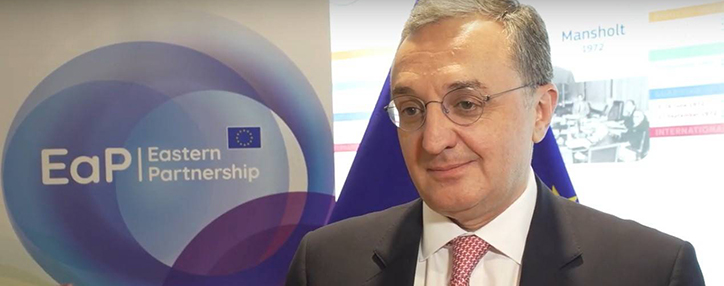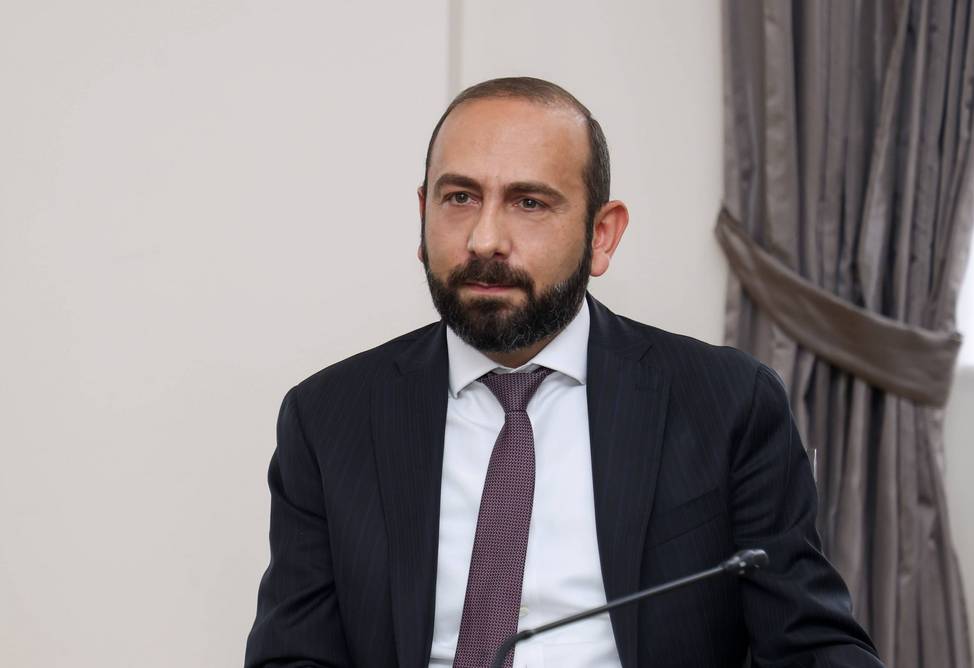Zohrab Mnatsakanyan about his brief conversation with Elmar Mammadyarov
15.05.2019,
12:46
Armenian Foreign Minister Zohrab Mnatsakanyan told journalists after the high-level meeting held to mark the 10th anniversary of the EU Eastern Partnership that he had a brief conversation with his Azerbaijani counterpart Elmar Mammadyarov on the sidelines of the event. Asked by journalists if they discussed prospects for a meeting between the two countries leaders, Mnatsakanyan said: “Wait a bit. We are waiting for some specifications for the next round, for a meeting, and a hosting side should say when it is possible…” Mnatsakanyan said there are no problems.

YEREVAN, May 15. /ARKA/. Armenian Foreign Minister Zohrab Mnatsakanyan told journalists after the high-level meeting held to mark the 10th anniversary of the EU Eastern Partnership that he had a brief conversation with his Azerbaijani counterpart Elmar Mammadyarov on the sidelines of the event. Asked by journalists if they discussed prospects for a meeting between the two countries leaders, Mnatsakanyan said: “Wait a bit. We are waiting for some specifications for the next round, for a meeting, and a hosting side should say when it is possible…” Mnatsakanyan said there are no problems.
Asked if Washington will host the meeting, the foreign minister said that it is expected, but added that it would be wrong to stay ahead of the hosting party.
In his words, Mammadyarov said that Baku remains adamant in its reluctance to see Stepanakert as a party in the talks. Mnatsakanyan said that the Armenian side insists on its participation in the negotiations.
“I will repeat – we have spoken over the matter many times, and this is an extremely practical issue, since if Artsakh is deprived of taking part in this process, it strikes hard at the effectiveness of the process,” he said. “Our approach is very practical, very effective and logical.”
Karabakh conflict broke out in 1988 when Karabakh, mainly populated by Armenians, declared its independence from Azerbaijan.
On December 10, 1991, a few days after the collapse of the Soviet Union, a referendum took place in Nagorno-Karabakh, and the majority of the population (99.89%) voted for secession from Azerbaijan.
Afterwards, large-scale military operations began. As a result, Azerbaijan lost control over Nagorno-Karabakh and the seven regions adjacent to it.
Some 30,000 people were killed in this war and about one million people fled their homes.
On May 12, 1994, the Bishkek cease-fire agreement put an end to the military operations.
Тalks brokered by OSCE Minsk Group are being held over peaceful settlement of the conflict. The group is co-chaired by USA, Russia and France. -0--
Asked if Washington will host the meeting, the foreign minister said that it is expected, but added that it would be wrong to stay ahead of the hosting party.
In his words, Mammadyarov said that Baku remains adamant in its reluctance to see Stepanakert as a party in the talks. Mnatsakanyan said that the Armenian side insists on its participation in the negotiations.
“I will repeat – we have spoken over the matter many times, and this is an extremely practical issue, since if Artsakh is deprived of taking part in this process, it strikes hard at the effectiveness of the process,” he said. “Our approach is very practical, very effective and logical.”
Karabakh conflict broke out in 1988 when Karabakh, mainly populated by Armenians, declared its independence from Azerbaijan.
On December 10, 1991, a few days after the collapse of the Soviet Union, a referendum took place in Nagorno-Karabakh, and the majority of the population (99.89%) voted for secession from Azerbaijan.
Afterwards, large-scale military operations began. As a result, Azerbaijan lost control over Nagorno-Karabakh and the seven regions adjacent to it.
Some 30,000 people were killed in this war and about one million people fled their homes.
On May 12, 1994, the Bishkek cease-fire agreement put an end to the military operations.
Тalks brokered by OSCE Minsk Group are being held over peaceful settlement of the conflict. The group is co-chaired by USA, Russia and France. -0--



